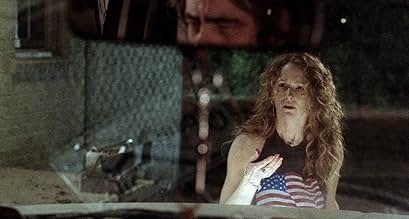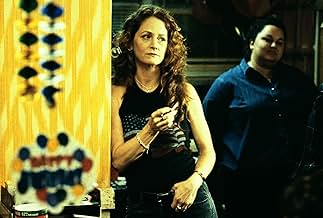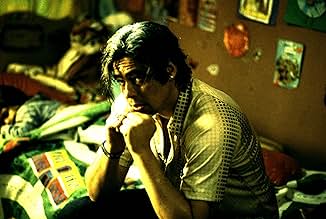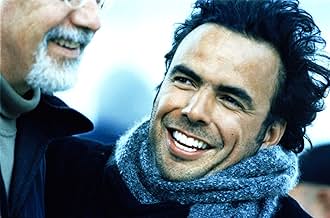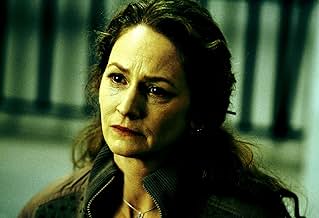Um acidente estranho junta um matemático doente, uma mãe em luto e um ex-presidiário.Um acidente estranho junta um matemático doente, uma mãe em luto e um ex-presidiário.Um acidente estranho junta um matemático doente, uma mãe em luto e um ex-presidiário.
- Indicado a 2 Oscars
- 30 vitórias e 79 indicações no total
Marc Musso
- Freddy
- (as Marc Thomas Musso)
Avaliações em destaque
They messed up it so hard. Who thought it's a good idea to make the chronology of the scenes in the almost random order. You get the ending spoiled by the first half hour and you can predict majority of the story already. This movie had potential, the actors were amazing, the story itself would be interesting if not for the chronology. Such a failure.
Some movies are like a novel. Some movies are like a poem. Some films have flashbacks and flash-forwards. Some, like `Memento,' stretch the boundaries of convention and take wild risks such as moving the drama from the end to the beginning. `21Grams' is a cinematic poetic explosion, shaking all the pieces hard as hell, and then tossing them in the air to fall at random. Directed by Alejandro Gonzalez Inarritu, he gives the audience the puzzle unraveled, demanding that we piece together the story from interlaced past, present and future events. It is part flashy gimmick, part artistic mastery, but always compelling.
This is not a film for either the faint of heart or lazy of mind. Nor is it for those who become frustrated by film that dares to step outside the linear plot and paint-by-numbers formula. The mishmash of past/present/future is allegorical in the sense that we all carry our past, all hinge our hearts on the future, and all struggle with a `present' as dotty and haunted as this film so wildly illustrates.
In `21 Grams' it is required that the viewer surrender. As in life, there is no control. I must admit that I became a bit antsy and pressed for answers when none were being provided. You are riveted by events and players that intermingle in a haphazard mishmash of time with a rebellious lack of structure. You can either go with the flow-or back out to your car. Since I saw only one person exit the theater, for any reason, in the 125 minutes running time, I conclude that the fully occupied theater was as riveted as I was, even to the point of extreme bladder control.
The performances are stunning. Sean Penn is always good, Benicio Del Toro solidifies his Oscar, and Naomi Watts is the big talent to watch. Her emotional honesty is beyond acting-I believed her to feel the pain she displayed.
The `plot' almost seems inconsequential. The film is about the depth of human feeling in our brief interplay between living and dying. It's about damnation and redemption, revenge and forgiveness, surrender and salvation. It offers no explanations. It merely illustrates the human experience in a trenchant manner that makes us aware that every minute of every day is a precarious drama that we look upon more lightly than we should. The dramatic cortex is the human heart-lost, gained, tormented, anguished and confused. The metaphorical context is the fleeting nature of each heart's temporal beat and our desperately valiant struggle to flesh out our mortal hearts' desires.
This is not a film for either the faint of heart or lazy of mind. Nor is it for those who become frustrated by film that dares to step outside the linear plot and paint-by-numbers formula. The mishmash of past/present/future is allegorical in the sense that we all carry our past, all hinge our hearts on the future, and all struggle with a `present' as dotty and haunted as this film so wildly illustrates.
In `21 Grams' it is required that the viewer surrender. As in life, there is no control. I must admit that I became a bit antsy and pressed for answers when none were being provided. You are riveted by events and players that intermingle in a haphazard mishmash of time with a rebellious lack of structure. You can either go with the flow-or back out to your car. Since I saw only one person exit the theater, for any reason, in the 125 minutes running time, I conclude that the fully occupied theater was as riveted as I was, even to the point of extreme bladder control.
The performances are stunning. Sean Penn is always good, Benicio Del Toro solidifies his Oscar, and Naomi Watts is the big talent to watch. Her emotional honesty is beyond acting-I believed her to feel the pain she displayed.
The `plot' almost seems inconsequential. The film is about the depth of human feeling in our brief interplay between living and dying. It's about damnation and redemption, revenge and forgiveness, surrender and salvation. It offers no explanations. It merely illustrates the human experience in a trenchant manner that makes us aware that every minute of every day is a precarious drama that we look upon more lightly than we should. The dramatic cortex is the human heart-lost, gained, tormented, anguished and confused. The metaphorical context is the fleeting nature of each heart's temporal beat and our desperately valiant struggle to flesh out our mortal hearts' desires.
21 Grams features performances by Sean Penn, Benecio Del Torro and Naomi Watts that are remarkable not only for their believability, but also for the range of gut wrenching emotion they bring to bear. Telling his story almost violently out of sequence, Iñárritu makes no apology for presenting information in a manner that is often abrupt and/or confusing. His choice to juxtapose a myriad of images to reveal the complexities and subtleties of the characters challenges the viewer even as it elevates the story.
Each of the three main characters faces a series of crises that unfold in the fullness of Iñárritu's version of time. By so carefully painting characters' surroundings along with their reactions to the events that change their lives, lead characters are stripped to the bone. The supporting cast is nothing short of miraculous (notably Clea Duvall, Charlotte Gainsborg and Melissa Leo) and completes a wonderfully complex series of portraits of the three main characters.
Like few films in recent memory, 21 Grams fully reveals what it is to be human in the clutches of life's most challenging moments.
Each of the three main characters faces a series of crises that unfold in the fullness of Iñárritu's version of time. By so carefully painting characters' surroundings along with their reactions to the events that change their lives, lead characters are stripped to the bone. The supporting cast is nothing short of miraculous (notably Clea Duvall, Charlotte Gainsborg and Melissa Leo) and completes a wonderfully complex series of portraits of the three main characters.
Like few films in recent memory, 21 Grams fully reveals what it is to be human in the clutches of life's most challenging moments.
Alejandro Gonzalez Inarritu made a well-deserved leap into the renown film-making pool with Amores Perros, and his follow up 21 Grams shows him with plenty of talent to spare. He also gets three (or more, depends on how effective one thinks the supporting performance were) forceful, compelling performances out of Sean Penn, Benicio Del-Torro, and Naomi Watts. They're involved in three interlocking stories- Penn as a mathematician with a rottening health and a near-rottening relationship; Del-Torro's found Jesus Christ after being in and out of jail for part of his life; Watts is a house-wife who may have some deep troubles within her mind. Each of the three leads doesn't go for cheap drama, and each one plunges the depths of their own abilities to find truths that might not be possible with lesser material or a lesser director. I won't say much more about the stories, however I do have something to say about the structure of the film. The script brings some mesmerizing scenes, ones with great tragedy that bring out a viewer's compassion.
Never-the-less, there was something about the structure that I didn't think was all that great. In films like Once Upon a Time in America, Reservoir Dogs, and even Memento, the scrambled story structure had a purpose, adding appropriate twists and turns for the audience. 21 Grams (like Amores Perros in a sense) has that non-linear basis to it too, and sometimes it works for the audience to react. But I think there would be a lot more power to how these characters' fates and tragedies unfold if it was told linearly from start to finish. In many moments in the film I found myself knowing a little too much before a particular scene unfolded, or I found myself guessing about something that I didn't need to (one of the points of non-linear storytelling is answers first, questions later). It wasn't an aspect that made the film bad, yet the stock that writer Guillermo Arriaga and director Inarritu put into this structure over interlocking the stories in order, or perhaps telling each story separately, is the film's only drawback.
Never-the-less, there was something about the structure that I didn't think was all that great. In films like Once Upon a Time in America, Reservoir Dogs, and even Memento, the scrambled story structure had a purpose, adding appropriate twists and turns for the audience. 21 Grams (like Amores Perros in a sense) has that non-linear basis to it too, and sometimes it works for the audience to react. But I think there would be a lot more power to how these characters' fates and tragedies unfold if it was told linearly from start to finish. In many moments in the film I found myself knowing a little too much before a particular scene unfolded, or I found myself guessing about something that I didn't need to (one of the points of non-linear storytelling is answers first, questions later). It wasn't an aspect that made the film bad, yet the stock that writer Guillermo Arriaga and director Inarritu put into this structure over interlocking the stories in order, or perhaps telling each story separately, is the film's only drawback.
'21 Grams' tells of a number of loosely interlinked characters in an achronological fashion, jumping backwards and forwards over their stories. There can be reasons for doing this: for example, to reveal the plot in a way that offers an extra kick, or to enable the plot to conclude with a scene from the middle of the story that gains impact from the viewer's prior acquaintance with what happens next. Quentin Tarantino's 'Pulp Fiction' justified its own complex plot structure on both of these grounds. But in the case of this film, I couldn't see how telling the story in such a broken way was supposed to add anything; and the fact that most of the leading characters possess a death wish (or at least, very little will to go on living) hardly aided my emotional involvement. At times, the film appeared to be shaping into a story about the possibility (or otherwise) of redemption; but it never quite grew into anything more the harrowing tale of a number of people who suffer and (in some cases) die. The pretentious voice-over from Sean Penn's character that ends the film (and accounts for its title) felt to me like a desperate (and failed) attempt to inject some meaning into a movie strangely devoid of it.
That said, the acting is good, and the film is undoubtedly skilfully made. But "people die" is not, in itself, an adequate or interesting unifying theme.
That said, the acting is good, and the film is undoubtedly skilfully made. But "people die" is not, in itself, an adequate or interesting unifying theme.
Você sabia?
- CuriosidadesThe film was shot almost completely with hand-held cameras.
- Erros de gravaçãoWhen the Private Investigator gives Paul the revolver, he flips it open to show that it is loaded. He then spins the cylinder and we hear a ratcheting sound. When a revolver is open, there is no ratchet mechanism connected to the cylinder...it rotates freely and silently.
- Citações
[last lines]
Paul Rivers: How many lives do we live? How many times do we die? They say we all lose 21 grams... at the exact moment of our death. Everyone. And how much fits into 21 grams? How much is lost? When do we lose 21 grams? How much goes with them? How much is gained? How much is gained? Twenty-one grams. The weight of a stack of five nickels. The weight of a hummingbird. A chocolate bar. How much did 21 grams weigh?
- Cenas durante ou pós-créditosThanks to ÁLos amo!
- Trilhas sonorasCan We Get Together
(2003)
Written by Renee Funderburgh, Anson Funderburgh and John Street
Performed by Anson Funderburgh & The Rockets (as Anson Funderburgh and Rockets)
Licensed courtesy of Bullseye Blues & Jazz, a Rounder Records Group label
By Arrangement with Ocean Park Music Group
Principais escolhas
Faça login para avaliar e ver a lista de recomendações personalizadas
- How long is 21 Grams?Fornecido pela Alexa
Detalhes
- Data de lançamento
- País de origem
- Central de atendimento oficial
- Idioma
- Também conhecido como
- 21 gramos
- Locações de filme
- Empresas de produção
- Consulte mais créditos da empresa na IMDbPro
Bilheteria
- Orçamento
- US$ 20.000.000 (estimativa)
- Faturamento bruto nos EUA e Canadá
- US$ 16.290.476
- Fim de semana de estreia nos EUA e Canadá
- US$ 274.454
- 23 de nov. de 2003
- Faturamento bruto mundial
- US$ 60.466.876
- Tempo de duração
- 2 h 4 min(124 min)
- Cor
- Mixagem de som
- Proporção
- 1.85 : 1
Contribua para esta página
Sugerir uma alteração ou adicionar conteúdo ausente



